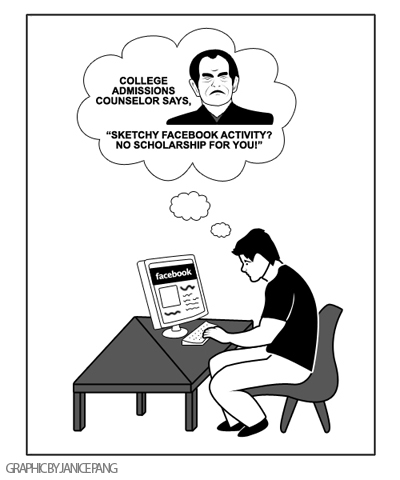
In today’s society, Facebook is an integral part of people’s lives, shaping the way colleagues and students communicate and share personal information. However, in recent years, Facebook has also become a way for adults to make judgments on minors based on their social networking profile.
There is an increasing trend with colleges using Facebook as a way to gain a better perspective of their current or prospective students. This raises the issue of whether or not it is ethical for colleges to look through the profiles of students. College and career advisor Laurie Tezak was amazed to hear that admissions officers at Stanford took the time to look through the Facebook profiles of prospective students of Stanford. “That’s one more thing that a student has to think about when applying to a college,” says Tezak. “[Putting your personal information online] might not be a big thing to students, but it can be a big thing [to colleges and future employers.]”
One way colleges have been looking at prospective students is by using a feature on Facebook known as Pages. Pages are user profiles of businesses, public figures, music artists and schools. Representatives from some schools register to create a Facebook Page. When a person “likes” or “adds” a page, it gives the page owner permission to view their personal profile. Colleges “request” unsuspecting students to view their profiles, inviting college representatives to view the profiles of the students who approved their request.
Although it may seem shocking that schools may be looking at your profiles, it is not as common as it seems. Trisha Liskay, the Aragon Senior Class Advisor, explained that although scores of admissions officers are hired during application deadlines, they do not actually take as much time looking through student’s profiles as students believe. In a survey of 401 schools conducted by Kaplan Test Prep and Admissions in 2009, only one in ten admissions officers actually looked through applicant’s profiles. More schools are beginning to develop policies relevant to using social networking in the admission process.
“[Students posting content on their profiles] may not be a big deal to admissions officers, but it will be a big deal for colleges,” says Liskay. “Be careful in who you invite on Facebook. They can see what you’re doing online.”
“They kind of almost go behind your back to see what other stuff they can dig up about you that they haven’t really asked you for,” says senior Monique Beaudouin.
“You don’t know if the person reading the application could discriminate based on how you look or how your friends are, so I think that it is an invasion of privacy.” says Jessia Hoffman.
“The one positive that can possibly come out of looking at Facebook profiles is that for our [personal statement] essays… looking at someone’s picture helps put a face to a name, and so it could help the [application] reader understand the essay better… but that’s only based on if they make a good impression or not,” says Hoffman.
Ultimately, students should take precaution regarding the kinds of content they post on any social network.
Tezak sums up, “Please, don’t put anything on Facebook that your mother can’t see.”





